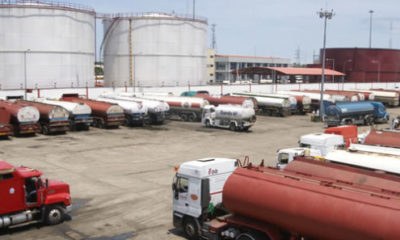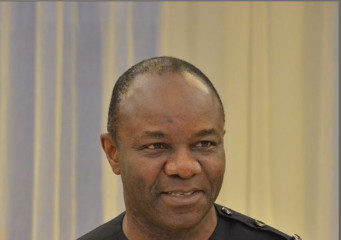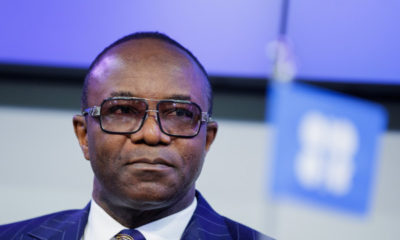News
Ibe Kachikwu Says Gas will Generate More Revenue for Nigeria Soon
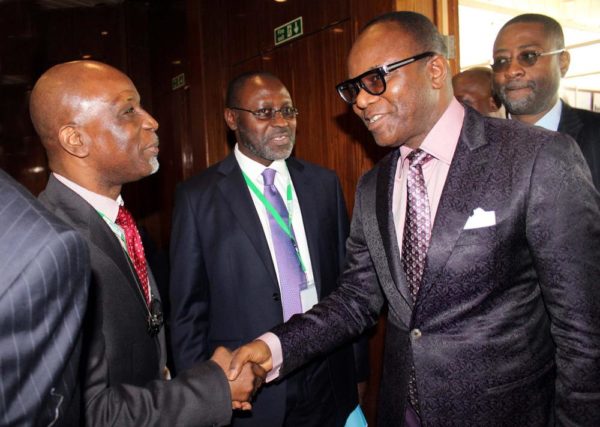
The Managing Director/Chief Executive Officer of Frontier Oil Limited, Dada Thomas (L) welcoming the Minister of State for Petroleum, Ibe Kachikwu to the opening of the 10th International Conference and Exhibition of the Nigerian Gas Association (NGA), in Abuja on Monday (31/10/16). Middle is the president of NGA and Managing Director of Oando Gas and Power, Bolaji Osunsanya. 8093/31/10/2016/Jones Bamidele/NAN
The Minister of State for Petroleum, Dr. Ibe Kachikwu, on Monday said that the Federal Government would give more attention to the development of gas as a major revenue earner for Nigeria.
Kachikwu, who stated this in Abuja at the 10th Nigerian Gas Association (NGA) International Conference, said that the country was determined to reverse its over-dependence on oil as benchmark for the economy.
The theme of the conference is “Nigerian Gas Roadmap and Its Potential for Regional and Global Influence: Its Implementation, Challenges, Opportunities and New Way Forward”.
The minister said:
I must say that over the years there has been a blatant neglect of this sector. We really haven’t focused on gas; all had been on oil production.
With regard to the recession today, it is clear to us that if we develop a two window of economic earnings, a lot of emphasis will move to gas.
We are going to be introducing new technical resources, restructuring existing departments and assigning new managers to the existing departments. These reforms are clearly articulated in the proposed national gas policy.
He said that the draft on Gas Policy would be released later and that the policy would promote a competitive business environment for both current and new investors.
Kachikwu said that government’s vision was to make Nigeria an attractive gas-based industrial nation, give primary attention to meeting local gas demands and develop significant presence in the international market.
He said that priority of government was utilisation of natural gas for domestic needs with the power sector as key priority end-user.
He added that government was in the process of completing draft legislation on reforms in the petroleum industry.
“The new fiscal policy we are working on will make gas a stand-alone, separate from oil and not consolidated on oil taxation. Our intention is to retain the current pricing framework for a limited period. It will end when sufficient gas volumes are built up to a level that will underpin a competitive gas market. Under such condition, wholesale gas price will be market-led,” Kachikwu said.
He said that gas flaring was still a prevalent practice in the petroleum industry, adding however, that government was clear protection of the environment was a more important objective than oil and gas production.
“Government is determined to see flare out in the earliest shortest time. We are seeking to exit gas flaring by 2020, 10 years before the 2030 deadline the UN gave.
To achieve this, a number of measures will be introduced; gas utilisation will be a priority consideration over every other consideration for handling of associated gas.
We will be increasing the gas flaring penalties to an appropriate level sufficient to de-incentivise the practice of gas flaring.
Our focus really will not be on penalisation; we will seek quite frankly to simply stop it and not you throwing money at us,” the minister said.
On the Petroleum Industry Bill, Kachikwu said:
On the subject of legislation, we are in the process of completing a draft legislation, the Petroleum Industry (Reform) Bill, which will address the institutional and regulatory reforms necessary for the petroleum sector as a whole.
With respect to the gas sector, the draft bill will capture the key positions in the gas policy, including addressing the current gap in the Petroleum Act by providing clear rules for the exploration, development and utilisation of gas. It will also address other issues that are of critical importance to Government and investors, such as: the issue of gas flaring, gas pricing, wholesale gas market development, and the basis for licensing of activities throughout the gas chain.
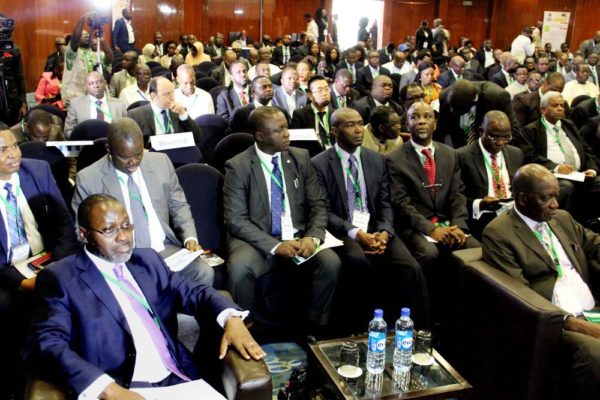
Pic.18. A cross-section of participants at the opening of the 10th International Conference and Exhibition of the Nigerian Gas Association (NGA), in Abuja on Monday (31/10/16).
8096/31/10/2016/Jones Bamidele/NAN
In his presentation, Group Managing Director of Nigerian Nation Petroleum Corporation (NNPC), Dr. Maikanti Baru, said that there were huge investment opportunities in the sector.
According to Baru, there is a $51 billion investment opportunity existing in gas processing and transmission and general infrastructure development.
He said that $35.4 billion existed in the power plants, gas exploration and production, fertilizer plants, virtual pipeline and flare gas commercialisation.
Baru also said that $16 billion existed in gas transmission pipelines, port infrastructure, real estate development, central processing facilities, pipe milling and fabrication yards and FTZ infrastructure development and concessioning.
He said that the proposed Gas Policy defined the boundaries between Upstream, Midstream and Downstream, processing facilities, pipelines, pricing, host communities engagement and conducive environment, among others.
He also said that there was a pragmatic road map to grow power generation capacity by at least, three folds within the next four years.
“The gas supply has been highlighted as the weak link in the development of the power sector. While we would not debate how we got here, we will rise up to the challenge of ensuring that gas is made readily available for the development of the electricity supply industry. It is clear that with a focused development, domestic gas can be harnessed to fuel the entire power demands of the country and beyond,’’ Baru said.
He added that the regulators and other government agencies, including Bulk Trader and Ministries of Finance, Power and Petroleum, would synergise on the imperatives of the sector “so that we begin to solve the problem”.


